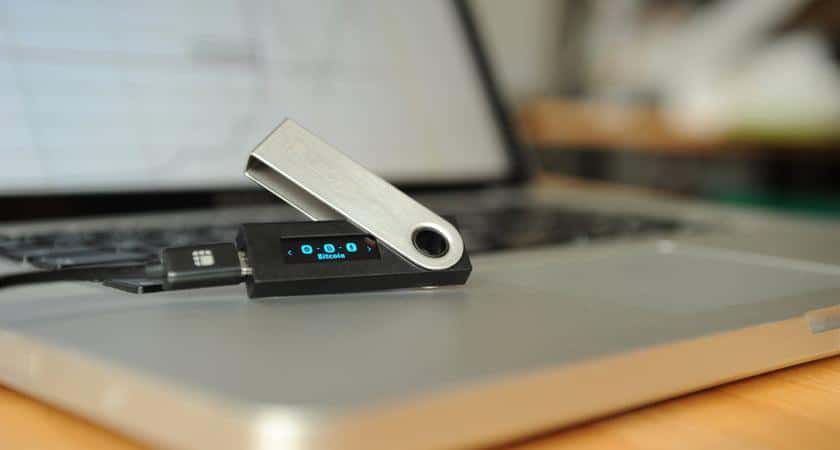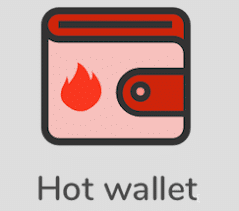When you buy cryptocurrency, you can leave it on the exchange where you bought it or transfer it to a crypto wallet, which is a type of storage system. A wallet will include two critical pieces of information: a public and private key. A public key (wallet address) is how you send and receive money to your account, like a bank account number. Your private key functions similarly to a bank password, allowing you to move money around and accomplish other things with your cryptocurrency. Once you decide to transfer your investment to a wallet, you will have to decide if you want a hot or cold wallet.
What is a cold wallet?

A cold wallet is a physical device that allows you to store your crypto offline. It usually comes in two different forms: paper and hardware.
A paper wallet is a printed sheet of paper with a QR code that holds a pair of private and public keys. You can generate a paper wallet offline. You only need a simple piece of technology to create your own private key. After that, you can enter it into computer software to generate a public key and wallet address.
A hardware wallet is a physical device that can store private keys and generate wallet addresses for numerous crypto assets. A hardware wallet is designed to be simple in order to keep cybersecurity risks to a minimum. As a result, it requires additional hardware (such as a desktop or a smartphone) to perform transactions. You can connect a hardware wallet to a secondary device using a USB connection, Bluetooth, or another method.
What is a hot wallet?

It’s a type of internet-connected digital storage that you may access from a cloud server, your computer, or your mobile phone.
Cloud wallets, often known as web-based wallets, operate on internet platforms that are managed by centralized corporations. They don’t have any apps of their own. However, you don’t need a browser to use them. You can transact with them through the applications run by financial intermediaries. As a result, cloud wallets are virtually always custodial.
Desktop and mobile wallets are apps that you can install on your own local electronic device. They have the advantage of being non-custodial. The secret keys contained in them are inaccessible even to their developers.
Hot wallets are not as secure from hackers as their cold wallet equivalents due to the internet connection. In addition to allowing you to retain your cryptocurrency on the exchange, some exchanges will provide you with a separate hot wallet.
Advantages of cold wallets
They are immune to cyber-attacks
They employ a seed phrase as a backup of private keys in addition to being PIN-protected. This could come in handy if you misplace your wallet or if your device fails.
The top digital wallet providers include a feature known as a passphrase. It acts as a backup password that allows you to access crypto accounts that aren’t visible when you merely input the PIN.
Support for several currencies
The most advanced hardware wallets allow you to store a wide range of cryptocurrencies from a variety of sources. As a result, these devices are ideal for diversifying your portfolio and investing in assets other than top cryptocurrencies.
Personal data is secure
When you use cold wallets, you don’t have to go through any identity verification. To create an account or when buying, you’ll only need to provide an email address.
Disadvantages of cold wallets
They are expensive
Hardware wallets do not come cheap. A cold wallet typically costs around $100; depending on how many cryptocurrencies you have, this might be dirt-cheap or incredibly expensive.
They are complicated
The challenges of employing paper and hardware wallets cannot be avoided. As a result, there’s always the chance that you’ll make a mistake. One of the risks of cold wallet mismanagement is the loss of funds. Making a digital backup of your seed word, for example, is an invitation to a data breach.
You cannot liquidate crypto easily
For example, during periods of high network congestion, a transaction may take days or even weeks to receive confirmation. Because cryptocurrency prices fluctuate considerably, attempting to convert your cryptocurrency into fiat currency can result in a loss.
Advantages of hot wallets
They are free
You just need to decide which one to use and is compatible with the exchange you use because they are all free.
You can easily liquidate crypto
Transactions are made easier using hot wallets. As a result, converting funds kept in them into your local currency is simple.
They are convenient
Crypto wallets are generally simple to use due to their custodial nature. You can invest in crypto with less stress if you are not personally responsible for private key administration.
Disadvantages of hot wallets
Hacking susceptibility
Heists frequently target these types of cryptocurrency wallets. As a kind of reassurance, several wallets ensure the funds are in their control. As a kind of reassurance, several wallets ensure the funds are in their control.
You have less control
The centralized body in charge of your hot wallet may put a hold on your account and prevent you from withdrawing funds. Your private keys’ keeper may flee with them, vanishing on you as well. It is best to use only reputable crypto exchanges and brokers.
Which is better?
It depends on the number of cryptos and what exactly you want to do with your crypto. A hot wallet can make it simple to move cryptocurrency back to exchange, allowing you to make new trades or cash out your holdings. However, because it is connected to the internet, it may be subject to online attacks, resulting in the theft of cash.
If you plan to buy and store cryptocurrencies for a long time, cold storage may be a better option because they are more secure. Keep in mind that you have to keep the seed phrase safe in case the hardware stops working.
Summary
Anyone aspiring to invest in the crypto debate on whether to use a hot or cold wallet. They both aid users in the storage, transmission, and receipt of tokens. Many experts argue that none of the wallets are superior to the others and that each is best suited to a specific type of activity. A hot wallet may provide greater convenience in online transactions, but it is vulnerable to hackers. The main benefit of a cold wallet is the increased level of security, although it has limited access options.